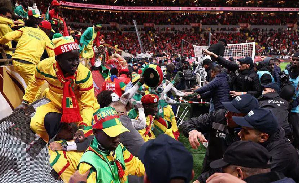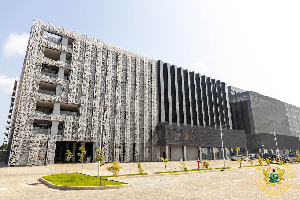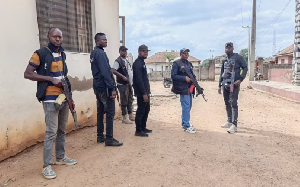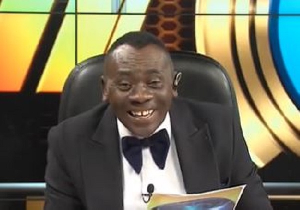My own daughter tells me I sound funny. She hates Uncle Richard because he sounds just like me. There have been a few times she has corrected some of my pronunciations. The other day, she almost yelled at me when she heard me say kokumba. Daddy, it’s cucumber, she pleaded. She particularly finds laughable my rendition of words that have the letter ‘R’ in them. When she calls me to cut some cake or get something for her, and I answer ‘I am coming’, when I am, in fact, heading upstairs, she retorts: ‘Daddy, but you are going.” When I finally come down and get her the ice cream, especially the flavours her mum would usually not give her, she plants a quick kiss on my cheek and her little vocal cords sing: “Thank you, dad.” When she picks the car keys for me, she also expects a similar reaction. Often she would remind me: “And what do you say?” That is only when I remember to say Thank you. My father never said that to me in 30 years, not even when I ‘bathed’ his car in the morning, hand-washed his clothes and pounded his fufu.
Frankly, I don’t have reason to blame my daughter. All her friends are whites and her mum is not Ghanaian. It is not too early to teach her about race and culture and colours, but I don’t find it very necessary, especially at that age. After all, she has confided in me that she suspects her friend Kimberly’s father might be her step dad, because he is not very nice to her when she visits their home. Interestingly, I don’t see any difference between my daughter’s way of life and linguistic behaviour, and the children of Professor Adjei-Kusi. These children cannot speak a single morpheme of their local language, Twi. They hate to be called Ghanaians, because they say it is too far from Canada. They don’t also like grandma visiting because ‘she cannot say a thing.’ So, Prof is compelled to also play along and watch the fruit of his African loins lose their identity to the snow.
This language imbalance, perhaps, is what big brother Gabby Asare Okyere Darko recently lamented in a Facebook post. The two scenarios I have described above pale in comparison with the brute effort Ghanaians living in Ghana invest to have their children speak as though they lived in Buckinghamshire, or Atlanta Georgia. My two nieces and nephew do not speak any Twi at all. When their Canada-based uncle asks them ‘Ete sen’, they respond with an almost foreign-accented ‘I am good.’ Sometimes, they just say ‘Good.’ We used to say ‘I am fine. Thank you.’ The response was so rehearsed that we actually said ‘Am fine,’ often forgetting the subject ‘I’. We managed to say what we could in English. Where you couldn’t cope with the demands of colleagues who spoke English better than you ever would, you either avoided their company or fought them at the least provocation. And to think that you were punished when you spoke vernacular, many of us feigned dumb when they asked a question, or practically deaf when it was your turn to ask. Talk was not cheap then; it was English.
English reigned. When a new pupil or student who spoke English very well joined your class, he quickly made friends with the girls. The teachers liked him more than all of us. He would usually be the class or school prefect. The language was useful. You yearned to speak it as effortlessly as those you envied. Twenty years on, I still find it difficult to forgive George Plange for stealing Linda Osei-Kufour (May her soul rest in peace) from me. Some of us started speaking Pidgin English very early because we just lacked the confidence to speak proper English. Today, George teaches English literature at a very good American university. Linda had died in Cuba in very strange circumstances.
English still reigns today. Even this apology I write here has earned me a lot of sweethearts. The sad reality is that most Ghanaian parents (never mind if they have PhDs) would rather their children spoke English so well and spoke no Ghanaian language at all, than to wish that the converse was the case. So, perhaps, I can understand why Prof Adjei-Kusi has never bothered to correct his children’s almost sacrilegious mispronunciation of ‘Adjei’ as ‘Agyae’ and Kusi to sound like the rodent. I can also understand why my daughter has flatly rejected the Ghanaian middle name I gave her. They may have noticed that even though we pretend to celebrate our culture and our language, our admiration of the sheer order of things in our adopted countries, and our wanton denigration of our own systems back in the Sahara, betray our hypocrisy. They may have noticed that we, even in our 50s and 60s, are trying desperately to sound like the native English speakers. They may have noticed that we are very happy about our American and Canadian passports. We dressed them nicely for the citizenship ceremony. They may have noticed that daddy just complains about life in the cold but he is happy that his kids have had to skip the academic anaemia at Suhum Secondary-Technical.
To make up for this not-so regrettable identity problem, some Ghanaians abroad have set up language schools, where they teach kids Ghanaian languages and some cultural lessons. I have visited some of these centres in the past. It looks like a good effort at striking the language balance but it appears counterproductive. The same parents who drive the kids to these schools do not speak the local language with them on their return. When they go to their main schools, it’s all English or French. These kids are not stupid: They know that they are the envy of their contemporaries studying under trees in Ghana. They know that most kids their age would be excited to be in Canada. They are not worried that they cannot speak their local language. In fact, the shallow-minded ones are proud that they cannot speak it. They are usually those who would say they understand what you say but cannot let out those difficult words. To them, English is their first, local language, and they are happy that they speak it better than mum and dad.
The balance Gabby is calling for is not even possible in our universities. At secondary school, we were not proud to show our faces as Akan students. Linguistics students who study aspects of a Ghanaian language as part of their university course, do not do it with the same enthusiasm as the French students aiming at Paris. Folks would sign on for Swahili but wouldn’t take a Masters degree in Twi with pride. I have proofread and edited statement of purpose papers for at least three Ghanaians gunning for a PhD in Canadian Studies (History). Ghana also has a history, you know.
More than a balance of language(s), we need what Chinua Achebe calls a balance of stories. For, language is embedded in the larger story. When we are able to balance our stories, the language would fall in just fine. There, spring will be reborn under our bright steps (David Diop). The balance is important if we want to make Chinese and South Korean strides. There may be virtue in the truism that, countries that have achieved a good balance between the indigenous, national and official languages, have done great.
Kwesi Tawiah-Benjamin
Ottawa, Canada
bigfrontiers@ymail.com
Opinions of Sunday, 28 August 2011
Columnist: Tawiah-Benjamin, Kwesi














